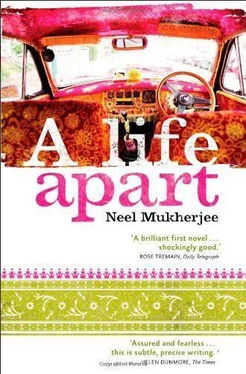5. Several people at the urinals. Sometimes this has what Ritwik calls the ‘honeypot effect’ — one or two cruising men at the urinals suddenly start attracting practically all the cottagers in the St. Giles toilets until there is a row of men, cocks out, checking each other out, all heads tilted left or right, angled downwards, sometimes craning back to catch the eye of someone at the pissoir across on the other side of the mirrors and sinks. It is a predictable set of movements, but of all the methods, this gives the most direct access to the goods. This is when it becomes most transparently a marketplace: there is no pissing around, wasting time and acting out tired old moves; it is sharp, to the point and immediately effective. Or not, but in that case at least the people involved are not left hanging on, thinking will he won’t he will he won’t he while doing some more hand-drying and pretend pissing and all that nonsense.
No. 5 is also unflinchingly frank: Ritwik knows quickly who wants him and who doesn’t. Rejection, however couched, even if it involves just tucking a penis in and moving away to a position beside another person, is still rejection and potentially bruising. But it’s all part of the game, or the logic of the meat market: would a shopper buy maggoty meat out of kindness to the poor lamb which had died or the butcher who didn’t have any better? Ritwik himself has learned, a bit too efficiently, to reject: it is best done swiftly otherwise he accuses himself of leading them on and feels slightly guilty about it. Also very pleased, because someone fancies him. To be in the position of saying ‘no’ to someone and turning him down is one of the greatest luxuries in life, he reckons. He has it here, sometimes.
There are the beginnings of a fraternity here among some of the regulars, of whom Ritwik has become one. He smiles at some of them, or nods and acknowledges their presence and some are glad of this small social gesture. It’s not solidarity or anything, just a flickering registration of the commonality that brings them together underground. They don’t know each other’s names, where they live, or indeed, where they disappear once they reach the upper world. They only exist for each other in this strip-lit netherworld.
Ritwik has had sex with a couple of these regulars. There’s Martin who works for British Rail, has short spiky hair and a goodnatured leer permanently stuck on his face. And the other man, whose name he doesn’t know or hasn’t bothered to find out, who takes off all his clothes, every single stitch, and leaves his cubicle door wide open while playing with himself and fingering his arsehole. He shuts it as soon as he hears new footsteps but if he thinks it’s safe he opens the door fully again.
There is no rivalry within this set of people; in fact, when a newcomer arrives and shows an interest in one of them, the rest, who know they are not fancied, egg on the lucky one. They keep watch if the people they are familiar with are having sex in the open: it’s a give-and-take, this one — they get the pleasure of watching and in return they provide an early warning service.
Sometimes they warn off each other from ‘time-wasters’, people who come and endlessly tease, hang around, show cock, peep, peer, lock themselves in cubicles for ages but ultimately never pick up anyone. Just as ‘genuine’ is a high recommendation in this world, ‘time-waster’ is equally pejorative. Ritwik is glad to have the more experienced ones dissuade him from running down such cul-de-sacs. It is, of course, a minor corollary of Sod’s Law that almost every ‘time-waster’ is gorgeous.
Ritwik also realizes, in slow stages, that his is a type of minority appeal, catering to the ‘special interest’ group rather than the mainstream, because of his nationality, looks, skin colour. He keeps pushing the word ‘race’ away. The mainstream is blonde, white, young, slim. Or, more accurately, that is the desired mainstream. He doesn’t satisfy the crucial first two although the last two can influence the swing cruisers.
One nameless man, to whose twoup two-down off the Woodstock Road he goes back one night from St. Giles, tells him how this world divides into two classes: the rice queens — men who fancy Oriental guys — and the potato queens — men who have a thing for white British men. That puts him in a type of classificatory limbo, although for lack of a better taxonomy the latter term will have to do. All in all, if the swing cottagers are taken into account, he doesn’t do too badly although it could be better, significantly better.
This cottaging business is developing into a kind of fixture in Ritwik’s life. Every evening, or almost every evening, he finds his way here unerringly, like an insect following a pheromone track. Sometimes he does a round at the Angel and Greyhound Meadow under Magdalen Bridge, but it is a less familiar dance, not of the thoroughly rehearsed St. Giles variety. Besides, St. Giles offers solid shelter from the frequent rains and wind. And an embarrassment of riches.
That, above all, is what he finds incredible — the sheer availability at practically all times, the accepted and understood fact that at certain types of places, at certain times, you can get what you want. It’s there for the taking; you just have to turn up and wait for it.
But there are good days and bad days. There are cold evenings of nearly frozen feet, the socks like a thick sheath of ice, spent waiting, waiting for footsteps which are few and far between, evenings when the cottaging population seems to have become almost extinct, or when the few available ones do not please at all. To wait is to experience time in its purest form; he understands how viscous, like treacle, it is in its unadulterated state. During these evenings, he paces around inside his cubicle, running to the hinge at the slightest sound. Some of these evenings seem to be jinxed — only the old, dirty-mac brigade seems to be out hunting.
Sometimes he sits on the toilet seat and thinks of how to carry on the essay from where he left off, still lying on his desk under the weight of a bottle of Quink. Sentences flit and hide, like a sudden green flapping and screeching of parrots overhead: It is the bright and battering sandal of representation that bruises Hopkins, not dark nights of the soul, not theological despair, not the fugitive presence/absence of God. How to hold and contain, how to speak God’s grandeur, and nature, His book’s, in fallen language, language ‘soiled with trade’, other than to burn, buckle and bend the old language to forge a new? This straining against linguistic representation is acted out as a personal drama of despair, but, paradoxically enough, the bruising of the poet releases his scent, like camomile or thyme crushed . . The rain beats out its peculiar music on the reinforced glass and concrete roof overhead. It lulls and comforts him. All he is waiting for is the sound of the right footsteps.
The room is enormous and for one which contains such a lot of furniture — an ornate gilt mirror, chairs, a sofa, a divan, a grand piano with its legs resting on small saucers of water to prevent insects from climbing it and building their colonies inside, and books, books everywhere, in glass-fronted dark wood cupboards taking up two entire walls and a large section of the third — it seems unusually full of light. The curtains are not heavy and the two doors are wide open, one to the courtyard, one to the interior, which is also filled with diffuse light on this sunny day, so rare for monsoon. Miss Gilby has time to take in the room and its furnishings before Bimala arrives accompanied by her husband for her first meeting with her English tutor and companion. Miss Gilby tries to steady her hand around her teacup; she is surprised she is as nervous with anticipation as possibly Bimala is this morning.
Читать дальше












